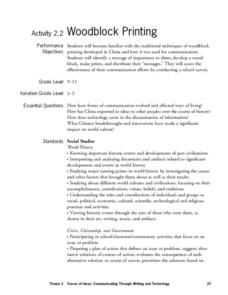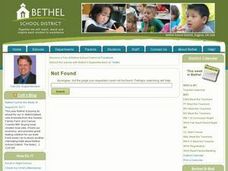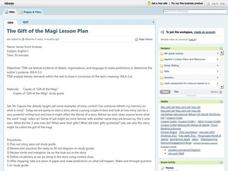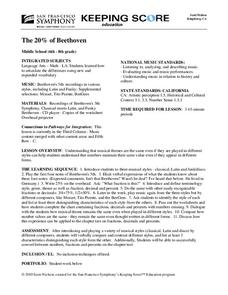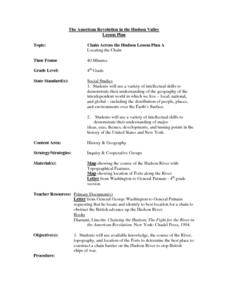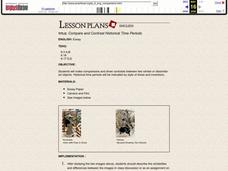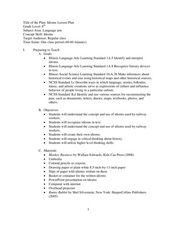Curated OER
Woodblock Printing: Early Printing Traditions in China
Students examine important role of woodblock printing in Chinese history, identify message important to them, and create woodblock prints to gain first-hand understanding of how it was used as tool for communication.
Curated OER
Ice Cream
Open this instructional activity by giving a brief history of ice cream. Using liquid nitrogen to lower the temperature, preteens make their own confection. The accompanying activity sheet queries learners about freezing point, the...
Curated OER
African American Literature in Art
Pupils compare art and literature by examining a contemporary painting by Glenn Ligon and the essay by James Baldwin that inspired it. They write an essay about a personal experience that relates to the theme of being an "outsider."
Curated OER
Using Timelines
Students explore how to create a simple timeline and make one of their life.
Curated OER
Simulation: Revolutionary Town Hall Meeting
Secondary historians simulate events leading up to the American Revolution. They assume the roles of patriots, loyalists, or neutrals in a town meeting set prior to the Revolution. As Patriots and Loyalists make their arguments, neutrals...
Curated OER
The Gift of the Magi
Test the true meaning of giving - and irony - with this lesson about "The Gift of the Magi." Using textual analysis, details, and text organization, middle schoolers make predictions about future events in the story and determine the...
San Francisco Symphony
The 20% of Beethoven
Compare Beethoven's fifth symphony to latin music and disco. Learners will listen to and discuss the elements found in the first part of Beethoven's composition. They'll then look for the same elements in Tito Puente and Bee Gees songs....
Curated OER
Chain Across the Hudson Lesson Plan A - Locating the Chain
Students read a letter from George Washington requesting them to identify on a map a location that would stop the advance of British warships. They choose a location and justify their choice.
Curated OER
Project Gilgamesh: Gilgamesh and Leadership
Do leaders need to be more moral than followers? Does power corrupt? Can anyone be a leader? Begin a study of leadership with a reading of excerpts from the Epic of Gilgamesh. After examining the ancient Mesopotamian hero, class members...
Curated OER
Compare and Contrast Historical Time Periods
What do images tell us about history? Dress, setting, and actions all convey cultural norms, and in essence, give reference to historical time and place. Learners compare and contrast Kunisada's Actor with Flute in Snow to Hokuei's...
Curated OER
The Hat
Honing reading and communication skills through the theme of farm animals is the focus of this lesson. Students read a book about Scandinavian farm animals and complete prediction journal activities. They complete a worksheet about the...
Curated OER
Introduction to Victorian Valentines
Students explore the history of Valentine's Day and how paper valentines became a tradition in Victorian times. Using a photo organizer, they select photos using tags. They use a software program to create a special image for their...
Curated OER
Today’s Telephone
Does your class know the history behind today's telephone? They will after reading a very interesting one-page informational passage. They'll learn all about the way phones have progressed to the amazing devices they've become as they...
Curated OER
General Lesson Plan for Documentary Lens
Use this general lesson guide to inform your instruction surrounding a documentary. The lesson is made up of five activities. The activities are intentionally general because they are designed to adapted for specific films. While the...
Curated OER
The Founding of Los Angeles, California
Seventh graders examine the social and cultural impact of settler groups in California and the origins of the founding of Los Angeles, California. They read and discuss an informational handout, and discuss what it is and was like to...
Curated OER
African American Traditions: Cameroonian and African-American Folktales
Young scholars compare Cameroonian and African-American folktales. In this folktales lesson plan, students participate in a jigsaw activity that requires them to read "The Owl Never Sleeps as Night," "Why the Lizard Often Nods," "Tappin,...
Curated OER
Idioms Lesson Plan
Sixth graders discover idioms. In this idioms lesson, 6th graders evaluate idioms and discover their meaning. Students read Runny Babbit by Shel Silverstein and create unique idioms. Assessment rubric is provided.
Curated OER
Centennial: Have I Got a Story for You
Students identify the clues that folklore provides about Utah's past, and create a piece of folklore for a place or event in or near their community.
Curated OER
Reading, Writing, Reciting Exciting Poetry!
Students complete a poetry analysis unit. In this poetry analysis lesson, students study poetry by reading, reciting, and analyzing poems and their poets. Students study poetic devices, write their own poems, and complete hands-on...
Curated OER
Immigration Push and Pull Factors
Eighth graders examine significant ideas, beliefs, and themes; organize patterns and events; and analyze how individuals and societies have changed over time in Maryland, the United States, and the world.
Curated OER
Literary Tour of California via Podcast
Young scholars explore California's authors and their lives. In this author study, students research different authors from California. They create podcasts about their authors, walking the audience through the author's life and points...
Curated OER
The History of Thanksgiving Day
Students discover details about the original Thanksgiving celebration. In this Thanksgiving lesson, students read an article about the topic and respond to questions about it. Students then plan a Thanksgiving celebration.
Curated OER
Bridges:Links to History
Seventh graders perform a research project based upon the study of the types of bridges. After preliminary research, student groups will search for four examples of each type located around the world.
Facing History and Ourselves
Do You Take the Oath?
Why did so many go along with Nazi policies during World War II? An investigatory unit includes four handouts, reading analyses, classroom discussion topics, and intriguing philosophical questions, helping learners understand the...


